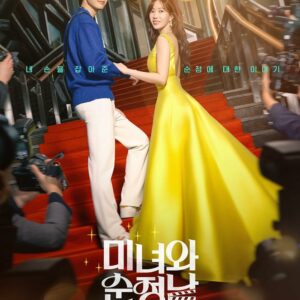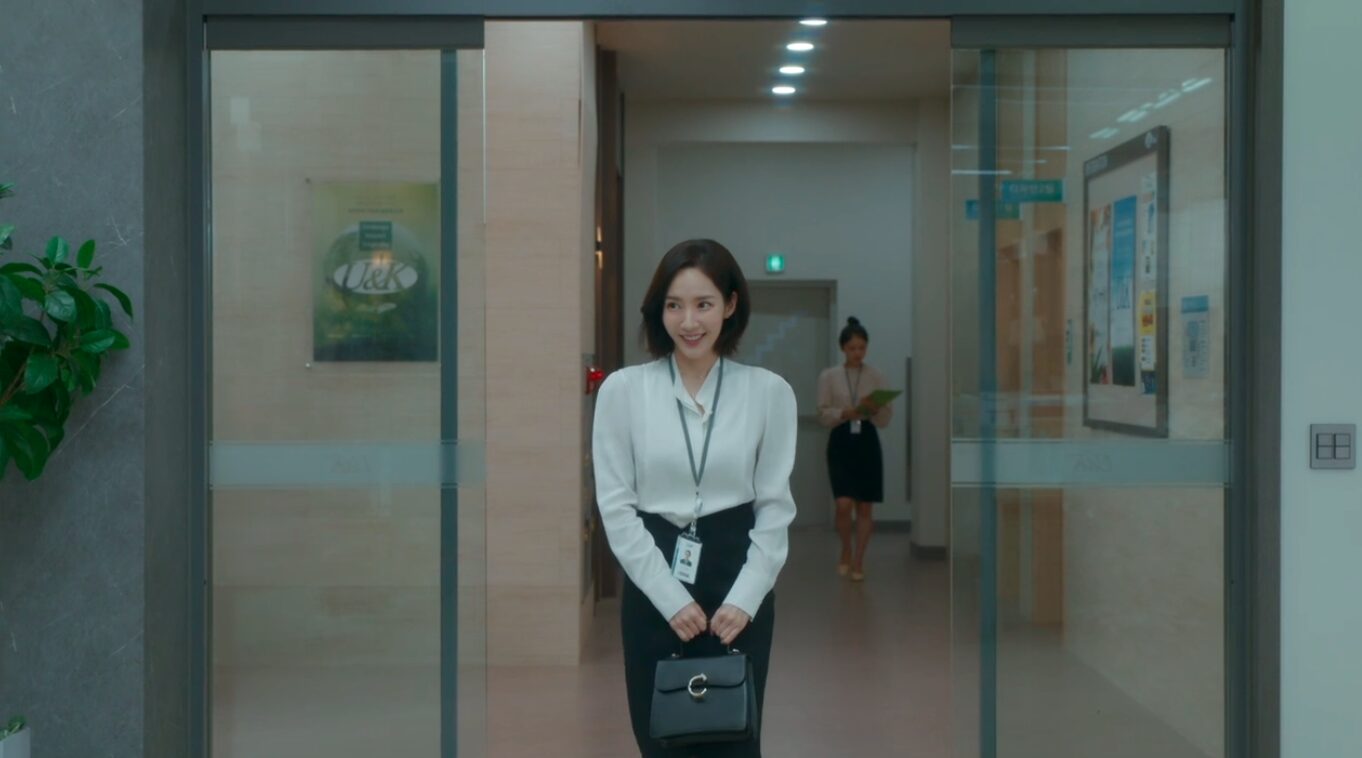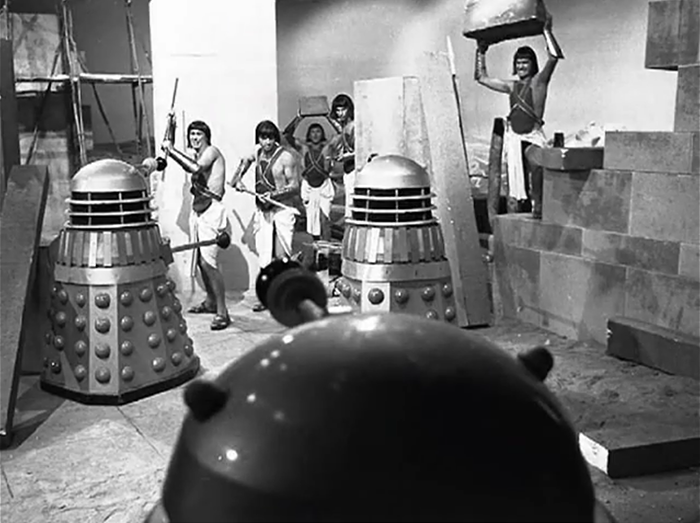I can’t believe Lee Soo-yeon wrote this
Blood Free is the latest science fiction offering from writer, Lee Soo-yeon; widely considered one of Korea’s best writers for her intelligent Forest of Secrets series. Nonetheless, Lee’s previous drama was Grid; the deeply ambiguous, time travel show that polarised audiences with its refusal to give viewers any answers and its slick, Disneyfied production that was at least two episodes too short.
Despite everything, I ended up enjoying Grid, and so I was looking forward to seeing Lee’s latest work – even as I side-eyed her continued association with Disney. Unfortunately, Blood Free turned out to be a big disappointment. Messy and half-baked, the sci-fi show about a food company that specialises in lab-grown protein feels like a rushed first draft of thought bubbles and character chalk outlines.
While it starts off well, the show quickly degenerates into a somewhat shallow (at times farcical) mess of cliches and tired conspiracies, combined with a dose of Alpha Superhero nonsense and tedious action sequences. Blood Free is positively anaemic.
Is it about political corruption? Corporatism? The impact of a disruptive technology? An existential study of humanity? A canvassing of corporate ethics? A warning against the widespread use of AI?
I don’t know and I’m pretty sure the writer doesn’t either.
In fact, it’s so incoherent that if you told me that Lee Soo-yeon did not actually write this, well, I would believe you.
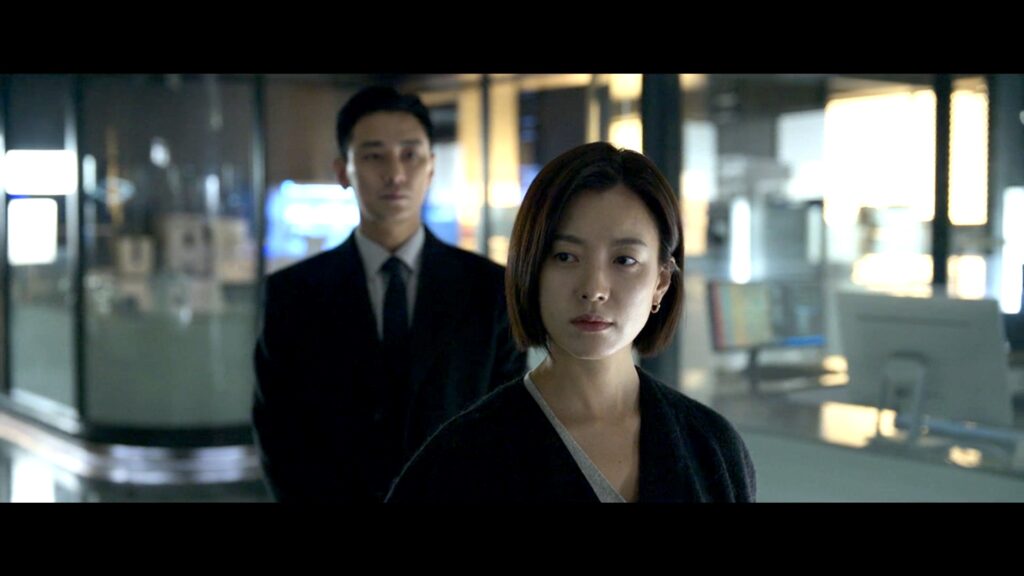
The Killer Opening Scene (pun intended)
Despite my overall assessment of the drama, Blood Free starts off with a bang and the first four episodes showed evidence of the writer’s deft procedural hand. The first scene lays down a series of ethical and moral cards for the show to play as it unfolded. It’s just a shame that most of those cards get left on the table as the show flounders in its back half.
In the near future, BF is a groundbreaking biotech company that has cornered the market on meat replacement with its lab grown beef and synthetic fur. They’ve now cultivated seafood and are set to expand to grain and crops. The show’s first scene is of a full 3D Sensurround virtual reality slaughterhouse, with previously happy, frolicking animals running in terror then being strung up and butchered between tables of corporate investors.
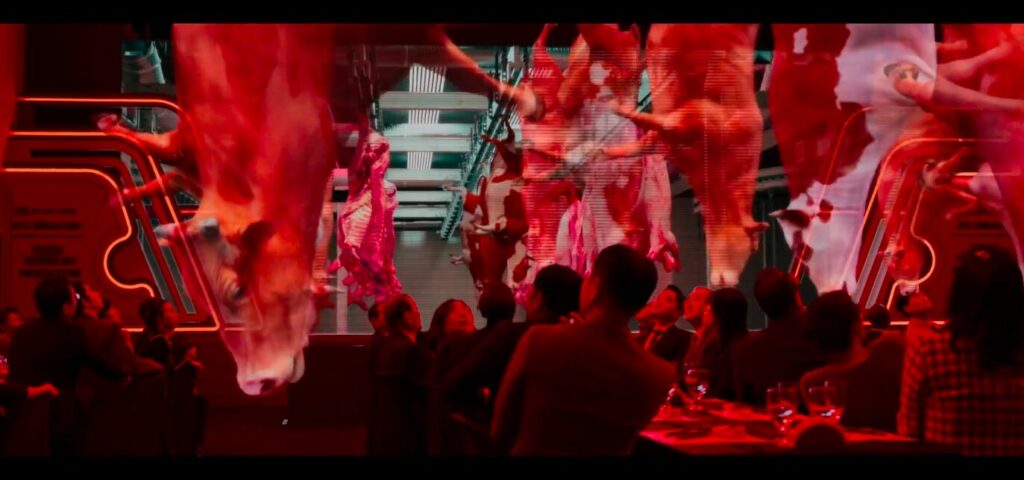
We meet BF’s chairwoman Yoon Ja-yoo (Han Hyo-joo) who delivers a product launch that could be either inspiring environmental manifesto or maniacal villain statement, depending on what angle it’s viewed. The ethical and environmental issues the company is grappling with are real and pressing. But BF is rapidly consolidating its control over the world’s food supply and already has 72% of the meat replacement market.
The very real problem of animal exploitation and its multiple ethical and moral quandaries is not being solved through public policy but by profit-driven corporatism; through the commodification and control of the population’s food supply by a single corporation. BF is both philanthropist and corporate villain; its leader both a saviour and a potential dictator. Humanity is trashing its ecosystem and cruelly exploiting all other life to do so, actions that will ultimately lead to its own destruction. But BF’s attempt to provide an alternative also provides the groundwork for an entirely different kind of dystopia; one based on a world-changing disruptive technology being owned and controlled by a very small elite.
It’s possibly one of the best opening scenes of a drama that I’ve ever seen. Or it would be, if any of this was what the drama was about. Instead, Blood Free unfolds as standard corporate intrigue with a dash of futuristic window dressing; a surprisingly shallow offering from a writer known for their depth and nuance. It is, in fact, much less than the sum of its parts.
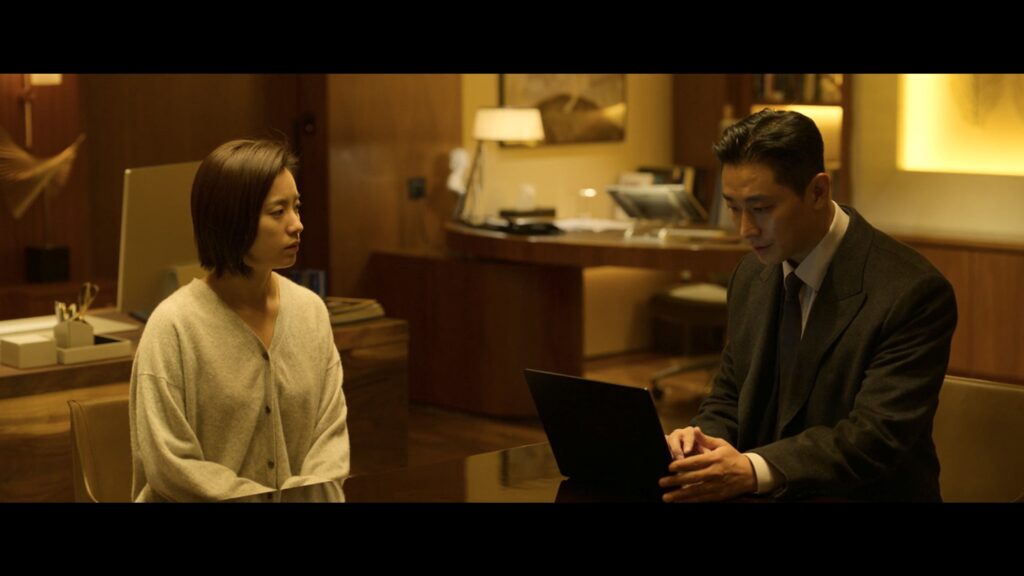
The Plot
After a traumatic incident in her youth, Yoon Ja-yoo decides to devote herself to stopping the wholesale exploitation of animals. It’s a noble goal but Blood Free’s Chairwoman never seems noble. Or idealistic. Or anything really. Shooting, I think, for calm, driven and self-contained, Han Hyo-joo’s performance comes across instead as flat and insipid. Yoon Ja-yoo isn’t inscrutable in any interesting way that speaks to a rich internal life. She’s just blank: a chalk outline waiting to be filled in.
The same can be said of bodyguard Woo Chae-woon (Ju Ji-hoon), whom Ja-yoo hires after a series of internal and external challenges; including death threats, ransonware and a slew of malicious articles. Chae-woon’s job seems to involve turtlenecks and hair gel, driving her into ambushes, and never wearing a bulletproof vest. His inscrutability is just as one-note; his entire personality consisting of a need for justice and ownership of a cat.
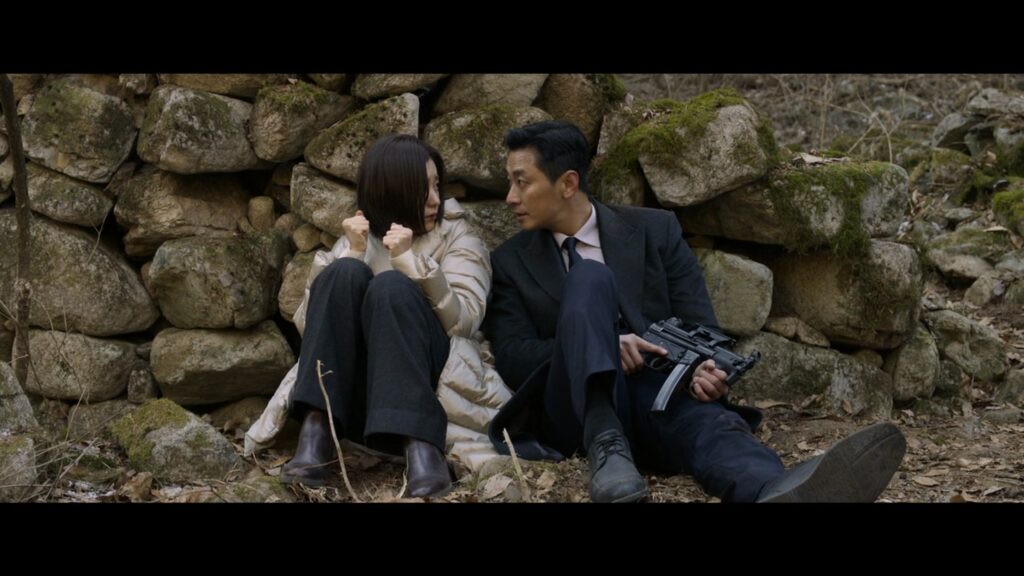
Ji-hoon – when he’s not engaging in casual tsundere sexiness and plot-driven stupidity – is secretly working for a former President who believes that Ja-yoo may be involved in a terrorist bombing that cost him several ministers and his legs. This bombing also killed one of Ji-hoon’s colleagues and has thus sparked his single personality trait – a quest for justice for a comrade-in-the-trenches.
Former President, Lee Moon-kyu (Jeon Guk-hwan) is either conspiring with or being used by his grandson and current Prime Minster, Seo Woo-jae (Lee Hee-joon) who wants both Ja-yoo and BF and not necessarily in that order.
As the show unfolds, it’s revealed that BF is the victim of a large coordinated campaign to wrest control of it away from Ja-yoo using cult-like brainwashing techniques (no, really) and the exploitation of those who feel left behind by her Brave New World. But they don’t want BF for its meat business alone. The company is secretly using its biotech expertise to grow replacement organs.
When Chae-woon dies in the line of duty, Ja-yoo uses him as a guinea pig for her replacement organs. Not only is he saved, he develops super powers as well. Prime Minister and all-round creep, Seo Woo-jae believes that by having replacement organs on tap he can live forever and maybe become a super human too.
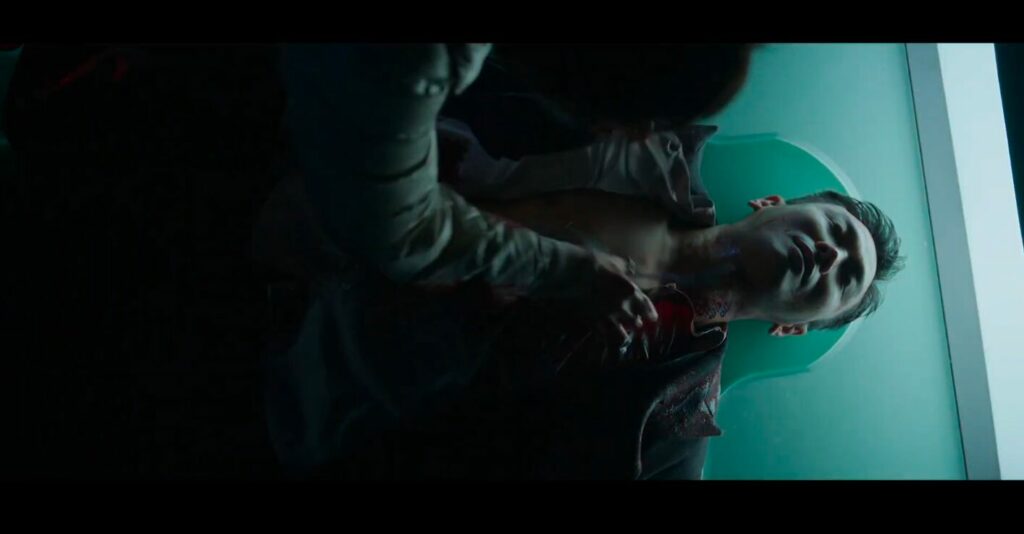
And if you think that sentence ended up in the twilight zone you are not alone. Blood Free makes the mistake of driving the plot forward by random action rather than by organic character-driven behaviours. Instead of exploring issues deeply or resolving core conflicts, the show keeps throwing out more plot points to drive things along – and some of these stretch credulity to say the least.
In a lesser writer, I’d assume it’s distraction plotting; a tactic used by writers for shallow high-action shows where audiences don’t remember or care about any kind of overaching plot or theme. But, in a writer like Lee Soo-yeon, it’s hard not to wonder if it’s instead a rushed first draft that went to filming before she had the time to flesh out any of the ideas. It’s the kind of thing you’d shrug off as forgettable fluff if you hadn’t tuned in expecting another intricately crafted piece of nuanced social commentary. Which is what makes it such a big disappointment.
Blood Free may be frustratingly under-developed across the board, but it also just doesn’t look any good. If the script is full of cliches, stereotypes and tired corporate machinations, the sets and lighting are just as uninspired. It adds to the general air of the show being rushed and, well, anaemic.
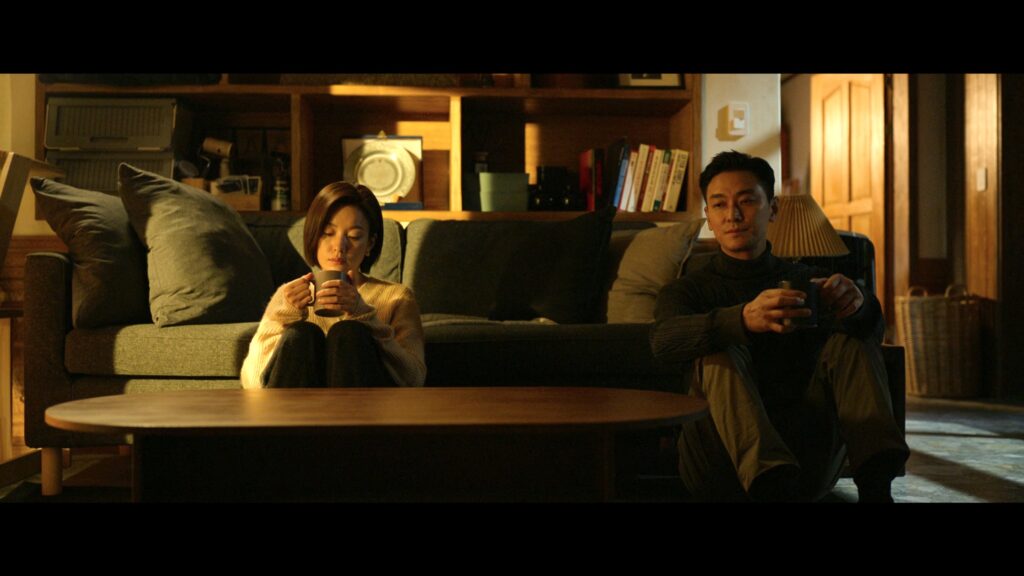
Six Million Dollar Turtleneck
When Blood Free opened, it had all the elements for a discussion of technology that is disruptive, socially as well economically. The new technology. The corporatisation and commodification of a public good. The regulatory system scrambling to catch up. The people set to benefit and those left behind economically. The balancing of social and individual wellbeing when faced with widespread cultural change. How do we respond – ethically, morally, legally – in an era of rapid social and technological development?
Instead, Blood Free’s second half seems to be some kind of bionic man superhero show (made more ironic by the fact that Chae-woon’s organs are entirely normal human tissue). Apart from being grown in a lab rather than a womb, the replacement organs are standard issue. Why does Chae-woon suddenly have super strength? Nobody knows. But he does.
Since there’s little a one-dimensional sexy bodyguard can do in a plot other than hit people while looking sexy, Chae-woon hits people. A lot. Which means giving him people to hit and people to save. This involves a lot of pointless action scenes that, by necessity, involves imperilling Ja-yoo. For a show about a successful female CEO trying to operate in an environment of rank chauvism, this pivot to damsel in distress is jarring and, frankly, annoying.
Why Blood Free decided to throw in a half-baked superhero plotline halfway through its runtime is a mystery to me*. It already had so much material to work with, so many moral and ethical quandaries to explore, and so many issues to resolve, that lobbing in superpowers starts to make it look like a random brainstorming session rather than a fully-realised script. And the back half of the show mostly involves Super Turtleneck being generically manly in a way that was definitely not toxic on account of him owning a cat**.
*tries not to take a crack at Disney
**fails
The dominant corporation species
In the end, what Blood Free comes down to is a rather generic corporate and political battle for control. But while this writer’s previous works have examined the nexus between Korea’s corporate, political and legal spheres and its potential for corruption and poor public outcomes, in Blood Free the whole thing is done as an etch-a-sketch with cliches and stereotypes. The older politician is well meaning but blinkered, his son-in-law an oafish Chaebol cliche, the youngest generation an amoral opportunist who moves between the political and corporate world depending on his mood.
Ultimately, what Blood Free seems to be examining is a standard Kdrama Chaebol fight for the kingdom the corporation. And while there are more interesting elements in the script about power and control, most of these are dropped in as half-thoughts and never picked up again.
For most of the drama, we’re stumped as to what Ja-yoo actually wants. To stop exploitation? To stop habitat destruction? The march of climate change? To save lives? To make money? To gain market share? To make up for the loss of her dead sister?
Later in Blood Free, Ja-yoo gives a monologue on why it’s so important for her work to succeed: humanity, she believes, cannot becomes the dominant species on the planet as long as it relies on other lifeforms for food (Dominant Species is also the Korean title for the show).
The sudden reference to dominance seems to contradict all the motivations we’ve been given for her behaviour up to this point – and also seems at odds with her stated aims of stopping animal cruelty and exploitation. It does suggest that what motivates Ja-yoo instead is a need to be the master planner of her environment. Isn’t that attitude what got us into this mess in the first place?
One of Blood Free’s more futuristic elements, is the advanced artificial intelligence that Ja-yoo uses to run, well, everything. As an engineered intelligence, it mirrors the development of an engineered food supply and engineered organs as well. Ja-yoo’s use of engineered intelligence, engineered food and engineered organs formed a picture of an entirely engineered world that speaks to a need for control.
Ja-yoo’s need for complete control – over the food supply, her business, her software, her living space, even her own internal organs – explains why, for example, at one point she countenances the torture of one of her own employees. But it also, frankly, makes her the real villain.
You would expect the drama to pause for a moment to ask us why an ethical corporation trying to stop animal cruelty is literally torturing people, but Ja-yoo’s enemies are so boorish, violent and exploitative that it’s hard not to think the drama is excusing this behaviour as somehow necessary. It certainly never stops to ask the question and you’re left wondering if you were supposed to at all.
It’s hard not to come out of Blood Free seeing Ja-yoo as, if not the villain, at least as corrupt, venal, hypocritical and ruthless as her own enemies. And yet the drama never seems to be making this comparison. We’re supposed to root for her (and her incompetent bodyguard) and feel angry at the forces lined up against her.
So either the show’s critique has gotten lost in translation or its ethical and moral lessons are somewhat confused.
We’re not blood free
Almost every review of Blood Free mentions the somewhat epic scene in the final episode where Jae-yoo is fighting for her life in a (completely ludicrous) defence of her facility from *checks notes* paramilitary prosecutors executing a search warrant. During this battle, one of her researchers tries to strangle one of the intruders with a lab-grown human intestine.
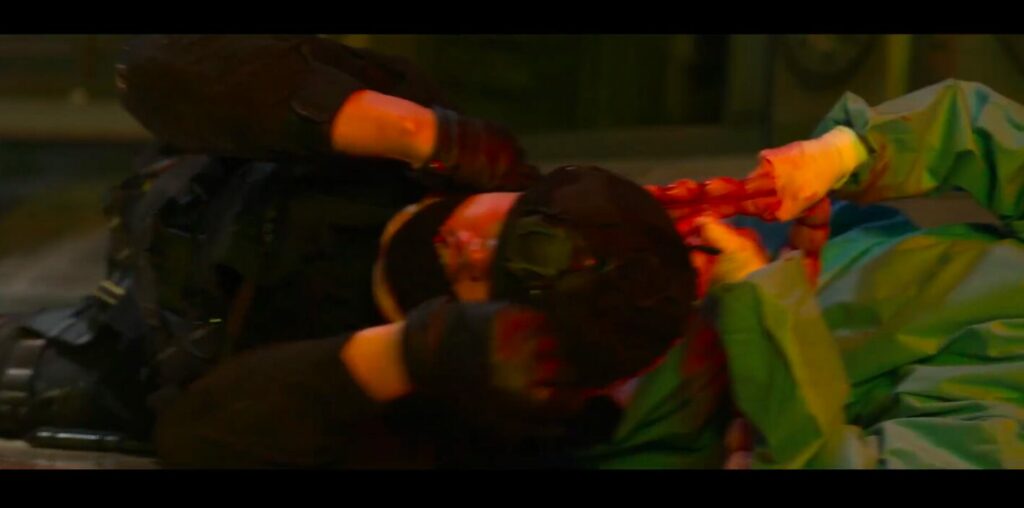
The final episode – aside from being extremely tedious with its back-to-back action scenes – is a blood-strewn affair that does seem to hint at a possible thematic point hidden underneath all the nonsense. A scientist dedicated to stopping pointless death strangles a soldier with a lab-grown intestine that was supposed to bring life.
With the amount of blood that humans will spill to try to survive, we will never be blood free.
And while that final note might suggest there is something secretly profound buried here, it’s so deep it may as well not be. Apart from a stellar opening scene and the odd hint here and there of themes that they probably wanted to explore but didn’t get around to, Blood Free is shallow and threadbare.
For a writer famed for exploring Korean social issues from a place of nuance, perception and intelligence, her villains are suddenly crass and stupid while her protagonists’ moral and ethical failings are swept under the rug or even portrayed as somehow acceptable. Character motivations are opaque and contradictory and if there was a theme there I couldn’t find it despite trying really really hard (as you can see) to do so.
In fact, this is such a mediocre piece of work that I have to ask again.
Did Lee Soo-yeon really write this?
Grid is available with full English subtitles on Disney+.

